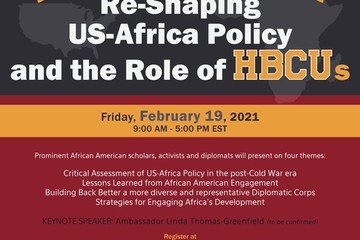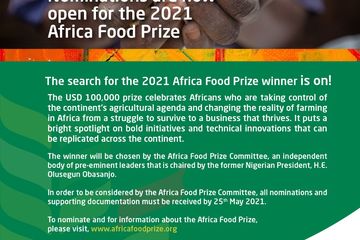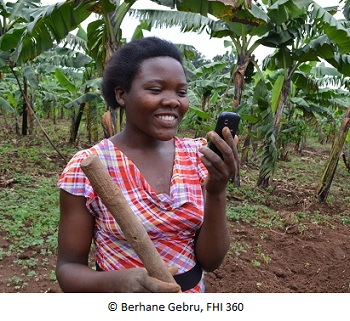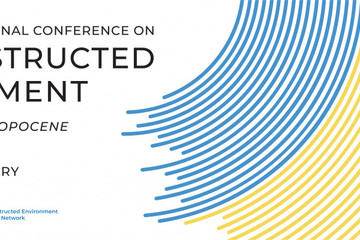Feed
-
9 PhD Scholarships Available with Animal Health Innovation LabThe Animal Health Innovation Lab in partnership with the University of Nairobi is offering 9 PhD scholarships. The fully funded positions, offered by USAID, will develop research and lab-based solutions to the East Coast Fever. In Kenya and East Africa, this tick-borne disease of cattle has created constraints to human nutrition and economic welfare. The multi-institutional and multi-disciplinary environment offers a unique opportunity for those seeking a PhD in a main research project at the Animal Health Innovation Lab. The application deadline is Feb. 10, 2021 at 23:59pm. Review the link and photo to apply! https://uonbi.ac.ke/news/feed-future-animal-health-innovation-lab-phd-scholarshipsBy: Madeleine FutterMonday, Aug 16, 2021AGRI-FOOD SYSTEMS+2

-
Journal of Slavery and Data Preservation PublicationWe are excited to announce the publication of Issue 2 of the Journal of Slavery and Data Preservation. On behalf of the entire team at Enslaved.org, we commend an impressive slate of contributors for joining us in a novel endeavor at the intersection of historical studies, anti-racism, and peer-reviewed, digital scholarly publication. We are looking to garner attention to this collection of rich data articles and could use your help! The data articles included in this Issue are: Legacies of British Slave-ownership, 1760-1880 Keith McClelland Database of Coroners’ Inquisitions Taken Over the Bodies of Enslaved, Formerly Enslaved, and Free Black Peoples in the U.S. South, 1840s-1890s Stephen Berry Take Them in Families: The Enslaved People of Casa Bianca Plantation, Florida Miranda R. W. Burnett & Martin H. Violette Contested Freedom: Free Persons of Color in Savannah, GA, 1823-1842 Marquis Taylor Enslaved People in the African American National Biography, 1508-1865 Steven J. Niven They Had Names: Representations of the Enslaved in Liberty County, Georgia, Estate Inventories, 1762-1865 Stacy Ashmore Cole An Editors’ Introduction describes these databases according to FAIR Guiding Principles for Scientific Data Management and Stewardship. #EnslavedOrg #JSDPBy: Elaina LawrenceMonday, Aug 16, 2021EDUCATION
No Preview Available -
Call for Papers for the 22nd International Conference on Knowledge, Culture, &Change in OrganizationWe are pleased to share with you the Call for Papers for the Twenty-second International Conference on Knowledge, Culture, and Change in Organizations, The University of Auckland, Auckland, New Zealand,14–15 January 2022.The Organization Studies Research Network comes together around a common concern for, and a shared interest to explore, new possibilities in knowledge, culture and change management, within the broader context of the nature and future of organizations and their impact on society. We seek to build an epistemic community where we can make linkages across disciplinary geographic and cultural boundaries. As a Research Network we are defined by our scope and concerns and motivated to build strategies for action framed by our shared themes and tensions.The Twenty-second International Conference on Knowledge, Culture, and Change in Organizations features research addressing the following annual themes and special focus: 2022 Special Focus: Rethinking Organizational Resilience Reimagining the Scholarly Conference Our mission is to provide a safe, sustainable, and accessible way for us to come together and interact as a Research Network. We are taking on these challenges by offering a blended conference experience, with session types explicitly designed to make the most of both online and place-based social knowledge processes. We are trying to move away from the either/or of place-based or online conferences. We are moving to bring conference presentations into the digital era. All presenters, in-person or online, will be given personal Presenter Pages: Linked to your profile page on CGScholar.com Displaying abstract summary Thematic connection to panelists and peers Ability to add digital media: video, sound, other files. You do not need to commit either to a place-based or virtual presentation at the time of submission. You can present both ways, or change your mode of the presentation if your preferences change.And all content will be displayed online.This way we build for our Research Network Members flexible, and at the same time resilient, spaces for communication, engagement, and participation. Become a Presenter Benefits of an Audience Pass Important Dates We welcome the submission of proposals at any time of the year. All proposals will be reviewed within two to four weeks of submission. Again, you do not need to commit either to a place-based or online presentation at the time of submission. You can present both ways, or change your mode of the presentation if your preferences change. Proposal & Registration Dates Proposal Deadlines Advance 14 Mar 2021 Early 14 June 2021 Registration Deadlines Advance 14 Apr 2021 Early 14 July 2021 Submit a proposal by 14 February 2021* Submit Your Proposal TodayBy: Elaina LawrenceMonday, Aug 16, 2021EDUCATION
No Preview Available -
HU Symposium on US Africa Policy - February 19Tune in on February 19 to this virtual symposium on Reshaping US Africa Policy and the Role of HBCUs! There will be an excellent line-up of speakers for this important and timely event. About 16 prominent African American scholars, activists and diplomats have been invited to present around four broad themes: Critical Assessment of US-Africa Policy in the post-Cold War era: Lessons Learned from African American Engagement: Building Back Better a more diverse and representative Diplomatic Corps: Strategies for Engaging Africa’s Development. This symposium seeks to draw on lessons of past African American policy engagement as well as present tangible strategies to mobilize an African American constituency for Africa and partner with HBCUs in rebuilding U.S. diplomacy and our diplomatic corps. Use the link below to learn more and register: https://cfas.howard.edu/Symposium-US-Africa-HBCUsBy: Elaina LawrenceMonday, Aug 16, 2021EDUCATION

-
Africa Food Prize 2021 nominations now openClick this link to learn moreBy: Elaina LawrenceMonday, Aug 16, 2021EDUCATION

-
Making Food systems Equitable: An African Dialogue on Gender and Food SystemsIn countries where women are most marginalized, discriminated under the law and where gendered norms prevent women from owning property and resources, people are also the hungriest. This is because gender equality and food systems are intertwined. However, too often, we only focus on the roles that women play in production, processing, trading of food and in making decisions about consumption and purchase of food at household level. And while this is important, we must also focus on whether the food system as organized is just and equitable and whether it promotes the empowerment and livelihoods and health of women and girls. Stark gender inequalities are both a cause and an outcome of unsustainable food systems, unjust food access, consumption and production. Tackling gender injustice and truly empowering women is not only a fundamental prerequisite for food systems transformation but also a goal. This dialogue is one in a series of regional dialogues to discuss how we can achieve the triple goal of gender equality, sustainable and healthy food systems. It will bring together scientists, farmers and farmer organizations, policy makers, consumers, private sector and others to discuss and share solutions on guaranteeing land rights for women, rural women’s economic empowerment, women’s voice and decision making in food systems, bridging the gender technology gap and more. Key outcomes of the dialogue include: (i) a set of solutions and commitments for gender equality in food systems (ii) an African position on what commitments are needed to achieve gender equality in food systems for the UN Food Systems Summit (iii) a community of practice to advance commitments on gender equality in food systems. To take part in the dialogue, please visit the Summit Dialogues websiteBy: Derek TobiasMonday, Aug 16, 2021AGRI-FOOD SYSTEMS
 No Preview Available
No Preview Available -
Call for PapersWe are pleased to share with you the Call for Papers for the Eleventh International Conference on The Constructed Environment, University of Calgary, Calgary, Canada, 12–14 May 2021.The Constructed Environment Research Network is brought together by a common shared interest in human configurations of the environment and the interactions among the constructed, social and natural environments. We seek to build an epistemic community where we can make linkages across disciplinary, geographic, and cultural boundaries. As a Research Network, we are defined by our scope and concerns and motivated to build strategies for action framed by our shared themes and tensions.The Eleventh International Conference on the Constructed Environment features research addressing the following annual themes and special focus: 2021 Plenary Speakers The International Conference on the Constructed Environment will feature plenary sessions by some of the world’s leading thinkers and innovators in the field. Eliot TretterAssociate Professor, Department of Geography and the Urban Studies Program, University of Calgary, Canada Leroy Little BearBlackfoot Researcher, Professor Emeritus, University of Lethbridge, Canada Kelly ColesPMP, Director, Design & Construction, Calgary Municipal Land Corporation, Canada Reimagining the Scholarly Conference Our mission is to provide a safe, sustainable, and accessible way for us to come together and interact as a Research Network. We are taking on these challenges by offering a blended conference experience, with session types explicitly designed to make the most of both online and place-based social knowledge processes. We are trying to move away from the either/or of place-based or online conferences. And at the same time be ready for the possibility of place based cancelation due to COVID-19. This way we build for our Research Network Members resilient spaces for communication, engagement, and participation. We are moving to bring conference presentations into the digital era. All presenters, in-person or online, will be given personal Presenter Pages: Linked to your profile page on CGScholar.com Displaying abstract summary Thematic connection to panelists and peers Ability to add digital media: video, sound, other files. You do not need to commit either to a place-based or virtual presentation at the time of submission. You can present both ways, or change your mode of the presentation if your preferences change.And all content will be displayed online.This way we build for our Research Network Members flexible, and at the same time resilient, spaces for communication, engagement, and participation. Become a Presenter Benefits of an Audience Pass Important Dates We welcome the submission of proposals at any time of the year. All proposals will be reviewed within two to four weeks of submission. Again, you do not need to commit either to a place-based or online presentation at the time of submission. You can present both ways, or change your mode of the presentation if your preferences change. Proposal & Registration Dates Proposal Deadlines Late 12 Apr 2021 Registration Deadlines Regular 12 Apr 2021 Late 12 May 2021 Submit a proposal by 12 February 2021* Submit Your Proposal TodayBy: Elaina LawrenceMonday, Aug 16, 2021EDUCATION


Leave a comment